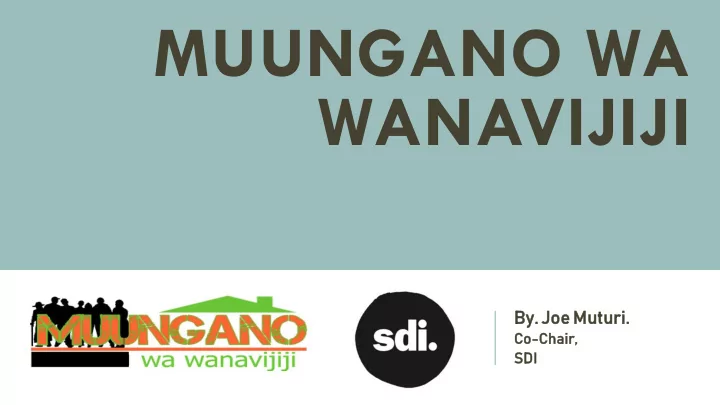

MUUNGANO WA WANAVIJIJI By. Joe Joe Mutur uturi. Co Co-Cha Chair, r, SD SDI
A TYPICAL KENYAN SLUM SETTLEMENT…1 Often located in close proximity to places of employment and relative to city centers. Housing majority of the city’s population (approx. 60% for Nairobi’s case) Smaller housing units of approximately 9-10sq. Meter. High average household size of up to 4 persons per house. Very high densities of up to 220 households per acre or 54,340 households per square Kilometer.
A TYPICAL KENYAN SLUM SETTLEMENT…1 Insufficient provision and access to services e.g. water and sanitation, health etc. With an estimation of over 200 households sharing 1 shared water point/tap. And over 20 households sharing one toilet seat.
RESPONSE TO COVID19 IN SLUM AREAS Top-Down Approach. Bottom-up Approach Spearheaded by the government through Ministry of Community’s and grass-root organizations and Health, county governments and a number of task CSO’s leading in response. Through: committees at national level. Dissemination of information May have direct interventions to slum areas: Generating information and awareness creation amongst residents. • Targeted mass testing. Generating slum specific needs, priorities and • Imposed travel restrictions. ensures directed support. • Cessation of movements in areas considered as hotspots. Active participation in various task committees established by government • Practices such as social distancing, wearing of masks. Provision of hand washing stations, masks, water, • Imposed 7pm -5am curfew. soaps and sanitizers • Closure of schools. Provision of food aid and cash transfers • Quarantine of suspected cases. Personal protective equipment (PPE’s) • Identification of national and county level isolation centers.
HOW WE LEVERAGED ON MUUNGANO’S SOCIAL CAPITAL..1 Taking stock of Muungano (Slum Dwellers Federation) membership reflected of its diversity within settlements. The Federation consists of youths involved in community media, women who are in saving groups, women as community health volunteers, human rights defenders, community opinion leaders, etc. Muungano decided to activate its membership to engage at their level in dealing with Covid 19. One important activity identified by Muungano was to conduct a daily monitoring of events regarding fight against Covid 19.
HOW WE LEVERAGED ON MUUNGANO’S SOCIAL CAPITAL…2 Initiated by Muungano wa Wanavijiji and supported by different partners- ARISE/PLAN International/Manchester university/SDI etc Currently collecting data in over 120 slum settlements in 4 counties in Kenya. Daily monitoring for the last 8 weeks using 2 sets of questionnaires: i. Gauge the level of community preparedness to deal with Covid19. ii. Identify actions/support, existing gaps and priorities for each community Close to 15,000 interviews conducted so far across the 4 counties. 7 settlement-level reports produced and shared back to the community and other partners (weekly reports). Information shared to government (task committees) and other support organizations (NGO’s and Private, corporate etc)- for targeted support.
OUR RESPONSE FROM BELOW AND HOW WE HAVE LINKED WITH NATIONAL INTERVENTIONS. Due to the organization’s pronounced contribution in informal settlements and our relationships with Nairobi County Government we were invited to sit in the Ministry of Health (MOH) sub-committees. Among our contributions in the sub- committee have been:- To share Muungano informal settlements profiling data, Computation of required hand washing facilities per settlement based on existing population, Sharing of weekly monitoring and evaluation reports informed by local communities’ feedback regarding COVID 19 and Provision of maps indicating possible isolation areas.
IMPACTS ON WOMEN, YOUTHS, ELDERLY, DISABLED ETC. IN SLUMS. Loss of livelihoods – majority depends on daily incomes from small businesses and employments which are greatly affected. Difficulty in obeying the governments directives (eg 7pm.- 5am curfew – with shared toilets outside the dwellings; social distancing – with smaller housing units and high densities; self-isolations – with lack of basic needs etc.) Increased demand for water resource and food across the slum population.
WHAT WE ARE LEARNING FROM COVID 19 RESPONSES – LEVERAGING FROM COMMUNITY ORGANIZING. Settlements with stronger CBO’s continued to benefit as others we still figuring what needed to be done. Some examples included Kibra, Mukuru Kwa Njenga, Korogocho and Mathare. Through: Assisted in sharing information regarding covid 19. Fundraised and contributed small amounts to set up water stations, soaps and sanitizers. Distributed food to the most vulnerable members of their community (the elderly, sick, and very poor members of the community). Asked for collection of garbage and improved provision/supply of water to their settlements from the government. Solidarity groups – private, individuals, collective responses to take care of the vulnerable. Frontline defenders – (CHV’s and Young Men and Women in Community Organization Groups) providing essential services – such as garbage collection to unblock paths, roads, drainages. Some savings groups used their savings in Mathare to fumigate their neighbourhood. Some of the saving schemes contributed fro their savings to buy food stuff and distributed to vulnerable community members.
CAPACITY NEEDS AND SUPPORT Government should support initiatives by different communities through grass-root organizations and partners with community level strengths. Capacity support must be considered to those Women and Men in the front – Community Health Workers, Care Givers, Garbage Collectors, Psycosocial Support Groups, Community Leaders etc. The support to include livelihood, leadership, health and wellbeing and psycosocial support.
REFERENCES. https://www.muungano.net/browseblogs/2020/5/23/23-may-2020-coronavirus- situation-tracker-for-kenyan-informal-settlements Images by Muungano wa Wanavijiji – Know Your City Tv
THE END Thanks.
Recommend
More recommend